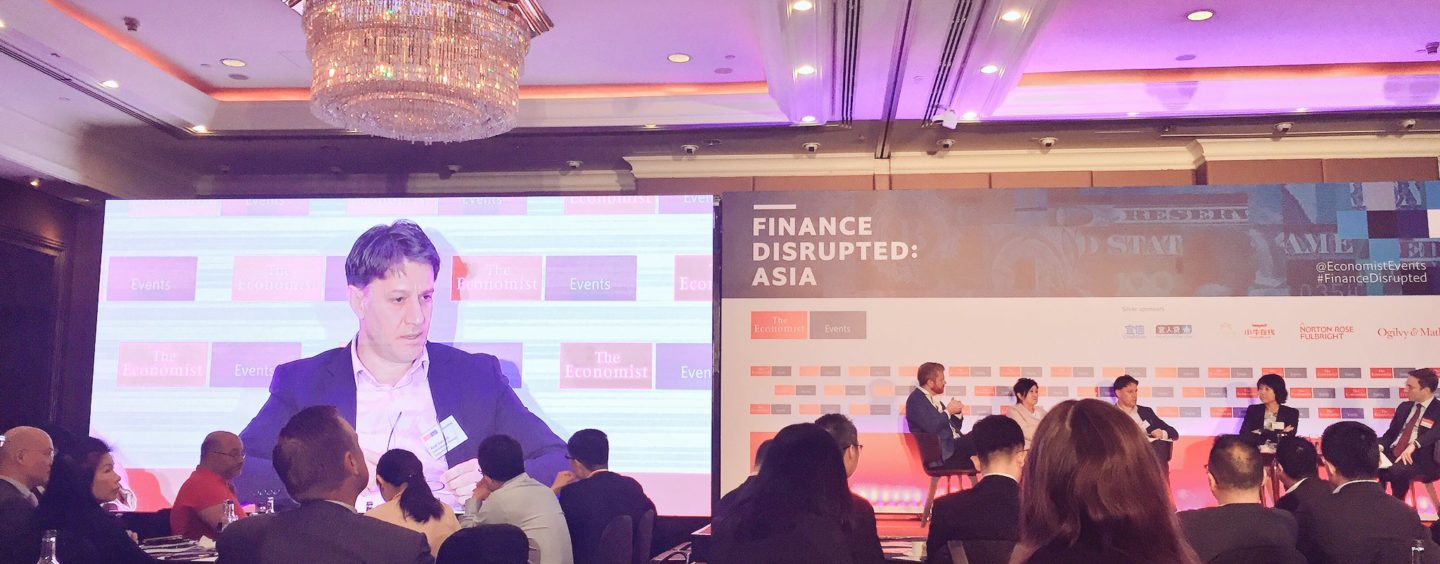“Is it actually gonna be the other way around with FinTech buying Banks ?”
Last friday, I attended the Economist Finance Disrupted Asia Conference.
As a former JP Morgan equity derivatives trader, founder of the Hong Kong startup community WHub.io and board member of the Hong Kong FinTech Association, I was eager to join listen, discover and ask questions.

Photo taken by Karen Contet Farzam
1. FinTech – WT# is it ?
Financial Service providers with technology as a driver to scale. The DNA should be Technology. But are we actually talking about FinTech or TechFin ?
Both startups and traditional finance companies are active in FinTech and this conference gathered speakers from startups, incumbents, VCs and regulators.
The FinTech startups often don’t look like a traditional bank or insurance company: they typically offer targeted solutions, as opposed to being one-stop-shops for customer financial service needs. On the other side, traditional banks, insurers and other large financial institutions have increasingly invested in FinTech as well and therefore it was not a surprised to see an Investors Panel including Arbor Ventures (Asia biggest FinTech Fund) and Goldman Sachs.
2. The new buzzword : Artificial Intelligence – why is it important and how is FinTech using it ?
Remember how everybody talked about Block-chain, peer to peer lending and robo-advisor platforms a couple years ago, now the trend has shifted to AI / Big Data. AI is already used to enhanced costumer support and automatized repetitive tasks, but does AI have the potential to disrupt ? Also one important point is that AI and Big Data are not regulated!
If you are interested in AI, don’t miss the AI & Future Tech fireside chat with Fabrice Fischer (ex CFO of Sentient) and Tak Lo (Founder of zeroth.ai, AI accelerator program)
3. Distributed Ledger Technology (DLT) – don’t say Block-chain
We had to wait more than one hour to hear the word Block-chain! Block-chain suffers serious “Branding issues” as it associated with Bit-coin. To get regulators and government onboard with block-chain implementations the industry is evolving and calling it as DLT. But is there really any big difference ? Block-chain is the big thing now and not bit-coin.
But although it seems like the perfect solution for KYC, nobody could tell when it would be actually available.
4. Incumbents – the Kodak moment

“DBS is a FinTech company” CEO DBS Bank HK Sebastian Paredes | Photo taken by Karen Contet Farzam
As 70-80% spending on IT for incumbents is used for maintenance and not innovation, it is not a surprise they are moving slowly. The 3 questions banks are asking themselves:
- Where do you find startups to work with ? (I actually have a solution for that)
- How do you comply with their culture ? (differences offer the opportunity to learn from each other and this actually works both way)
- How do you collaborate ? (you can organize a FinTech Hackathon for example)
Traditional banks that do not take FinTech seriously will experience their own “Kodak moment.” In 2012, Kodak – the company that invented the first digital camera – went bankrupt at almost the same time Instagram was being bought for 1 billion dollars by Facebook. Banks are conscious they have no choice and DBS actually called itself a FinTech company.
5. Regulators – the elephant in the room
Regulators were present and talk on a very interesting panel. Contrary to perceptions, regulators are more progressive than many banks themselves. It is also a fact that nobody advertises on their initiative. Hong Kong is famous for its regulatory stability and although it is has moved slowly (to say the least), I do believe we are entering a new era with more collaboration between FinTech and Regulators.
My key take-away is that regulators and FinTech should have a positive, collaborative attitude towards each other. A main theme is that regulatory demands are only going to increase, as FinTech continues to develop and disrupt financial services.
“We see a proliferation of non-bank banks”

Photo taken by Karen Contet Farzam
6. China – has they already won the FinTech revolution ?
China is the leader in terms of funding and influencing the market (e-commerce, internet financial model). It is already inspiring the rest of the world but although you can export an idea and inspiration how do you transport the model in other markets ?
No doubt China is the leader in FinTech retail, but the interesting point was why and how it could grow more and conquer the rest of the world ? Payment is the revolution in China as you do not need to carry money anymore, but is it because the population has been underserved with almost no access to bank accounts and credit cards ? There is a real opportunity for FinTech startups to offer to people who have always been underserved (eg Vietnam).
7. Quotes
“Innovate, iterate or be obsolete”
“VC is a network business. We have never invested in founders we have neither worked with before nor were directly introduced to us” – scary
In closing, here is my favorite question during the entire conference:
“Is it actually gonna be the other way around with FinTech buying Banks?”
This article first appeared on Linkedin
Featured image Economist Finance Disrupted Asia Conference via Karen Contet Farzam









